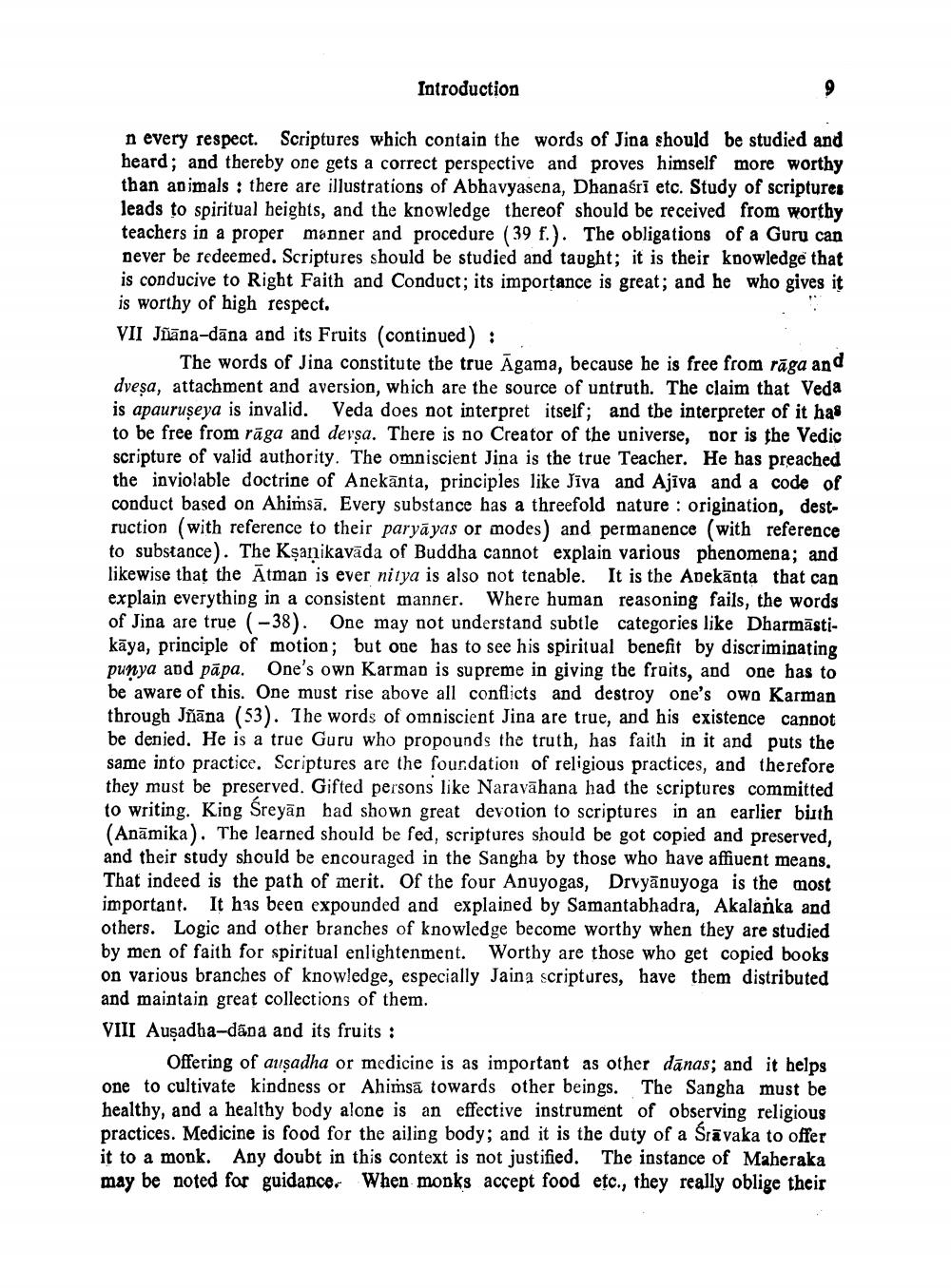________________
Introduction
9
n every respect. Scriptures which contain the words of Jina should be studied and heard; and thereby one gets a correct perspective and proves himself more worthy than animals: there are illustrations of Abhavyasena, Dhanasti etc. Study of scriptures leads to spiritual heights, and the knowledge thereof should be received from worthy teachers in a proper manner and procedure (39 f.). The obligations of a Guru can never be redeemed. Scriptures should be studied and taught; it is their knowledge that is conducive to Right Faith and Conduct; its importance is great; and he who gives it is worthy of high respect.
VII Jana-dana and its Fruits (continued):
The words of Jina constitute the true Agama, because he is free from räga and dveșa, attachment and aversion, which are the source of untruth. The claim that Veda is apauruşeya is invalid. Veda does not interpret itself; and the interpreter of it has to be free from rāga and devṣa. There is no Creator of the universe, nor is the Vedic scripture of valid authority. The omniscient Jina is the true Teacher. He has preached the inviolable doctrine of Anekanta, principles like Jiva and Ajiva and a code of conduct based on Ahimsa. Every substance has a threefold nature origination, destruction (with reference to their paryayas or modes) and permanence (with reference to substance). The Kaanikavada of Buddha cannot explain various phenomena; and likewise that the Atman is ever nitya is also not tenable. It is the Anekanta that can explain everything in a consistent manner. Where human reasoning fails, the words of Jina are true (-38). One may not understand subtle categories like Dharmastikaya, principle of motion; but one has to see his spiritual benefit by discriminating punya and papa. One's own Karman is supreme in giving the fruits, and one has to be aware of this. One must rise above all conflicts and destroy one's own Karman through Jñana (53). The words of omniscient Jina are true, and his existence cannot be denied. He is a true Guru who propounds the truth, has faith in it and puts the same into practice. Scriptures are the foundation of religious practices, and therefore they must be preserved. Gifted persons like Naravahana had the scriptures committed to writing. King Sreyan had shown great devotion to scriptures in an earlier birth (Anamika). The learned should be fed, scriptures should be got copied and preserved, and their study should be encouraged in the Sangha by those who have affiuent means. That indeed is the path of merit. Of the four Anuyogas, Drvyäinuyoga is the most important. It has been expounded and explained by Samantabhadra, Akalanka and others. Logic and other branches of knowledge become worthy when they are studied. by men of faith for spiritual enlightenment. Worthy are those who get copied books on various branches of knowledge, especially Jaina scriptures, have them distributed and maintain great collections of them.
VIII Auṣadba-dana and its fruits :
Offering of ausadha or medicine is as important as other danas; and it helps one to cultivate kindness or Ahimsa towards other beings. The Sangha must be healthy, and a healthy body alone is an effective instrument of observing religious practices. Medicine is food for the ailing body; and it is the duty of a Sravaka to offer it to a monk. Any doubt in this context is not justified. The instance of Maheraka may be noted for guidance. When monks accept food etc., they really oblige their




